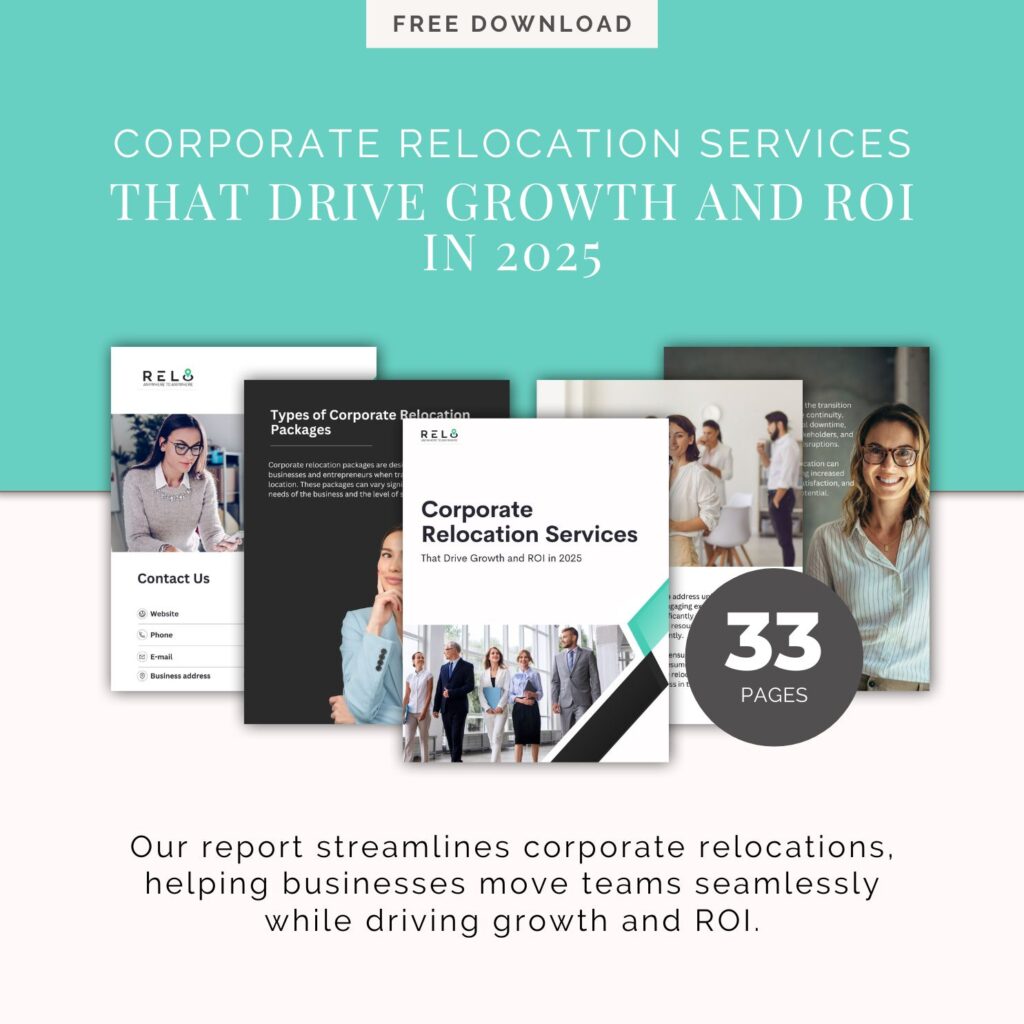Leaders face a question not just of scale but of alignment between location and strategy, talent and infrastructure, ambition and execution. Moving a corporate base, or even shifting operations to a different market, is not merely a geographic change. It’s a deliberate reset. A recalibration of what the organization needs to thrive, not just survive. Corporate relocation lets companies rethink their setup with focus and intent.
Strategy outweighs tradition. Location matters more than ever. Relocation often follows small inefficiencies and leads to stronger talent, better access, and more intelligent cost control.
Read on to discover how relocation, when planned effectively, can become a powerful lever for enhancing performance.
What is a Corporate Relocation Program?
A corporate relocation program is a structured process companies use to move employees from one location to another for work purposes. It covers logistical, financial, and administrative support to ensure a smooth transition. These programs often include services such as moving expenses, temporary housing, travel arrangements, and support for family members.
Larger companies often utilize relocation partners to alleviate internal workload, support growth, and retain top talent. A well-run program strikes a balance between business goals and employee needs, ensuring smooth and compliant moves.
? Related – Corporate Relocation in 2026 Will Transform Business Mobility Forever
Why Corporate Relocation Is on the Rise
Companies are required to make every element of their operations serve a bigger goal. From that perspective, location has become a controllable variable. Corporate relocation is no longer a reactive step; it is now a proactive approach. It is a calculated shift that opens doors to more stable costs, better access to relocating talent, and proximity to emerging business hubs.
EY reports 78% of leaders view relocation as a growth lever, while Deloitte found two-thirds saw better retention and engagement within two years.
Strategic relocation can cut costs by 30% to 50% and expand access to qualified talent. As remote work reshapes hiring, location now defines both savings and speed.
According to Randstad Sourceright’s workforce trends report, organizations that adapted their corporate relocation strategies saw a 53% increase in skilled applicant volume in emerging secondary markets.
Do Companies Pay You to Relocate?
Yes, many companies provide financial assistance when they ask employees to relocate. This support can range from a lump sum payment to fully covered moving services. The decision to offer relocation assistance often depends on the company’s size, budget, and the strategic value of the role. High-demand positions or senior roles are more likely to come with comprehensive relocation support.
Incentivizing relocation helps companies attract the right talent and reduce the stress that often accompanies a move. While not all employers offer the same level of support, negotiation is possible, especially when the move aligns with company’s needs.
Here is a typical relocation cost breakdown and coverage overview –
| Expense Category | Estimated Range (USD) | Often Covered by the Company |
| Professional Moving Services | $2,000 – $5,000 | Yes (Fully or Partial) |
| Travel to New Location | $500 – $2,000 | Yes |
| Temporary Housing | $1,500 – $4,500 per month | Yes (Short-Term) |
| Lease Termination Fees | $1,000 – $2,500 | Sometimes |
| Home Sale Assistance | $3,000 – $10,000+ | Senior Roles |
| Storage (Short-Term) | $300 – $1,000 | Often Included |
| Miscellaneous Expenses | $500 – $1,500 | Varies |
These averages vary by distance, housing costs, and company policy. Some firms offer a lump sum, others reimburse with receipts.
What is a Typical Company Relocation Package?
A typical relocation package may include coverage for moving expenses, temporary housing, transportation costs, and home-selling assistance. Some packages go further by offering visa support, job search help for spouses, and school-finding services for children. The goal is to minimize disruption and ensure that the employee can focus on their new role.
Packages vary by industry, location, and seniority. While some companies offer a lump sum, others provide tiered packages with additional benefits for executives or those with long-term assignments. Knowing what is standard in your field can help guide expectations and negotiations.
?♀️ Also read – What is a reasonable relocation package?
How to Get a Company to Pay for Relocation?
To secure relocation assistance, clearly state your need during the hiring or internal transfer process. Emphasize how your move supports company goals and offers estimates of potential costs. Be professional, informed, and open to discussion. Many companies are willing to provide support if they see the value in your relocation.
If the company does not initially offer relocation, ask what options they can provide. Framing your request around mutual benefit often leads to better outcomes.
Five Strategic Reasons Corporate Relocation Drives Business Performance
Relocating a business involves finding the correct location. When executed with intent, corporate relocation becomes a performance lever that impacts productivity, talent, and profitability. Companies that realign their physical presence with strategic goals often report measurable gains in growth and efficiency.
Corporate relocation can drive results through –
1. Cutting Operating Costs with Precision
Relocating to a more cost-effective city is often the first step in achieving better margins. From lower utility and rent prices to reduced corporate tax obligations, the upside adds up. For instance, relocating from a top-tier financial district to a regional city can yield over $2 million in yearly savings, depending on scale and business type.
2. Aligning with the Right Talent Ecosystem
Not every city grows talent in the same direction. Engineering excellence defines some hubs. Others are marketing innovation or logistics specialization. Corporate relocation helps position the organization closer to the ideal professional community. Strong local talent ecosystems reduce hiring friction, speed up onboarding, and improve retention.
3. Accelerating Speed-to-Market
When customer bases shift or when supply chains grow, location can either be a barrier or a multiplier. Companies that have optimized relocation strategies respond faster to demand spikes, get products to market quicker, and adjust inventory with greater control. McKinsey finds relocation near sales markets can boost conversions and delivery speed by up to 19% in the first year.
4. Improving Cultural and Organizational Agility
Relocating part or all of a corporate function often triggers a broader cultural renewal. Leaders review every touchpoint, from workspace design to daily routines, through a fresh lens. It creates an opportunity to adopt flatter structures, foster collaboration, and implement systems better suited to modern workflows.
5. Making Use of Tax Incentives and Urban Grants
Cities, states, and countries competing for corporate presence frequently offer compelling incentive packages that range from tax credits to real estate subsidies and training grants. For organizations in a scale-up phase, these offers can bridge capital gaps and shorten the timeline to profitability. Over the past decade, firms relocating to tax-friendly zones have seen a 28% return on investment (ROI) boost over three years.
The Relo.AI Impact on Smart Relocation at Global Scale
Intelligent decision-making starts with the proper framework. That’s where Relo.AI has created an advantage. The platform combines location data, industry benchmarks, and logistical modelling into one seamless workflow. It allows companies to evaluate relocation opportunities from every angle.
For example, a consumer technology firm sought to relocate its West Coast support centre to reduce wage pressures while maintaining service level quality. Relo.AI analyzed over 90 potential cities, considering metrics such as bilingual workforce density, real estate pricing, average commute times, and employment laws.
The team presented a shortlist within four weeks. The chosen city offered 42% payroll savings, a regional university with language-specialized graduates, and faster freight access to major distribution zones. Relo.AI simplified complex moves, boosting employee satisfaction by 27% and cutting support response times by 18 seconds. From startups to post-merger shifts, it aligns location with strategy.
Choosing Corporate Relocation as a Forward Strategy
Success today favours those who know when to adapt and how to do it efficiently. Corporate relocation has become an intentional advantage. Businesses with clear relocation frameworks outmaneuver competitors who remain in a fixed location.
Instead of reacting to rising costs, workforce attrition, or declining market access, organizations that move with data and alignment build resilience. They evolve ahead of disruption. Location then becomes not just an address but a growth engine.
It is the environment where corporate relocation thrives. And this is where the right partner matters.
Recommended read – Corporate Relocation and Family Support – Addressing Employee Needs
Download the Complete Corporate Relocation Planning PDF
Relocating an office, headquarters, or key business unit requires a structured approach. While strategy drives the “why,” success depends on the execution of the “how.” That is why we created a detailed Corporate Relocation Planning PDF, a ready-to-use guide designed to help your team stay aligned, on track, and fully informed at every stage of the move.
If your move is three months out or three years away, it will help you uncover gaps, establish priorities, and set realistic expectations with your internal and external teams.
Professionals using this PDF have reported significant gains in clarity, cost control, and timeline predictability. It is designed to be shared across departments, presented to leadership, and actively referenced throughout the relocation journey.
The guide also includes corporate relocation metrics covering cost, retention, and compliance to help you measure impact and improve decision-making throughout the process.
Access the PDF and take the first step toward a structured, confident relocation experience.

Final Note
Corporate relocation is a strategic decision that enables businesses to realign operations, access new markets, and position themselves for long-term growth. When done with precise planning and purpose, relocation strengthens talent pipelines, reduces operational inefficiencies, and creates space for innovation. The companies that lead through relocation are those that approach it as a business transformation, not a logistical task.
With the proper framework, partners, and performance metrics in place, relocation can become a catalyst for renewed focus, agility, and sustainable growth.
Plan the Move That Moves Your Business Forward
Every high-impact relocation begins with one conversation. If your leadership team is considering the possibility of relocating operations, it is helpful to have clarity from the outset.
Relo.AI provides industry-tested guidance, data-driven recommendations, and comprehensive end-to-end relocation support.
Get the relocation blueprint tailored to your business goals. Schedule your FREE consultation with us now.
Location no longer limits growth. Growth moves where opportunity leads.
Resources –
- EY 2023 Global Mobility Outlook
- Deloitte Global Workforce Trends Report
- Randstad Sourceright Talent Trends Report
- McKinsey Global Locations Strategy Insights
- International Economic Development Council (IEDC)
- Global Business Cities Index











